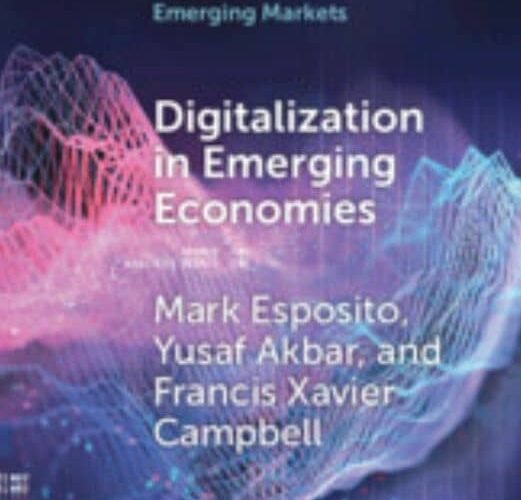Governance and Transformation – A Theoretical and Empirical Synthesis
- Introduction: Locating Abia within Emerging-Economy Governance Discourse
In light of contemporary scholarship on governance and development in emerging economies, Abia State under Governor Alex Otti presents a living case study of what Tarlok Das (2023) calls “the optimum size of government intervention.” Das argues that transformative growth in developing contexts depends on the precision of governance—where state action is neither excessive nor negligent, but calibrated to enhance productivity and institutional trust. This equilibrium has been achieved with notable fidelity in Otti’s Abia: a government that acts decisively yet transparently, intervenes constructively yet prudently, and mobilizes state resources with fiscal restraint and moral clarity.
- Digitalization and Institutional Reform
Mark Esposito, Yusaf Akbar, and Francis Xavier Campbell in Digitalization in Emerging Economies (2025) highlight that digital tools are catalysts for good governance when used to reduce leakages and democratize access to information. Governor Otti’s decision to digitize Abia’s revenue collection, financial reporting, and project monitoring systems perfectly mirrors this thesis. Through online publication of the 2024 Approved Budget, Citizens’ Budget, and quarterly fiscal reports, Otti institutionalizes what Esposito et al. term “algorithmic transparency”—a form of digital governance that replaces opacity with data accountability.
- Corporate and Public Governance Synergies
Ngwu, Osuji & Stephen’s Corporate Governance in Developing and Emerging Markets (Routledge, 2016) proposes that sustainable reform depends on aligning corporate discipline with public accountability. Otti, a former top banker, brings this corporate ethic into state administration—treating the treasury not as political loot but as shareholder capital in the collective enterprise of Abia’s development. His reforms exemplify the fusion of private-sector efficiency with public-sector ethics, echoing McGee, Hussainey & Mozghovyi’s (2021) empirical conclusion that governance quality improves when financial decision-making follows corporate best practices.
- Innovation Governance and Developmental Planning
In the Research Handbook on Innovation Governance for Emerging Economies (Edward Elgar, 2019), scholars emphasize that innovation flourishes where governance creates an enabling institutional ecosystem. Governor Otti’s establishment of an Economic Management Team and his emphasis on evidence-based budgeting represent precisely this model—where the state is both a facilitator of innovation and a guarantor of standards. Abia’s investment in SME-friendly infrastructure and urban renewal projects resonates with this global understanding of innovation governance as a driver of inclusive growth.
- Government Intervention and Social Equity
Tarlok Das’s framework on “proportionate state intervention” explains why Otti’s administration stands out among subnational governments. The clearance of ₦40 billion in salary and pension arrears is not just an economic act but a moral one—it restores the social contract between state and citizen. By re-allocating resources toward human welfare and operational efficiency, Abia demonstrates that disciplined spending and compassion are not mutually exclusive, but complementary imperatives of modern governance.
- Governance and Development Outcomes: Theoretical Reflections
M.S.B. Ali’s Governance in the Developing World (Springer, 2024) identifies transparency, institutional capacity, and leadership ethics as the triad of sustainable development. Under Otti, these principles converge in measurable outcomes: rising Internally Generated Revenue (₦15.5 billion in six months), timely wage payments, and the creation of transparent fiscal architecture accessible to the public. Abia thus represents what Ali defines as “governance maturity” within an emerging-economy context—a self-correcting, data-driven system where accountability precedes applause.
- Philosophical Perspective: Leadership as Moral Agency
In Aristotelian terms, Otti’s administration embodies phronesis—practical wisdom guided by virtue. Governance here is not performative but principled, not populist but purposeful. The philosophical underpinning of his style is consistent with virtue ethics: prudence, justice, and temperance as operational norms. His leadership recalibrates the meaning of public service from entitlement to stewardship, setting a precedent that situates Abia within the best traditions of developmental governance found in the literature of emerging economies.
- Conclusion: Abia as a Governance Prototype
Across theoretical and empirical frameworks—from Esposito’s digitalization to Das’s intervention model—Governor Alex Otti’s Abia aligns with global best practice. The administration demonstrates that good governance in emerging economies is neither accidental nor external; it is the product of intentional leadership, institutional discipline, and moral conviction.

Abia State today stands as a microcosm of what scholars describe as the developmental state reimagined—a subnational polity where digital governance, fiscal prudence, and ethical leadership converge. Otti’s legacy thus extends beyond his borders: he has positioned Abia as a prototype of twenty-first-century African governance, proving that transparency, technology, and integrity are not aspirations—they are attainable realities.
AProf Chukwuemeka Ifegwu Eke







